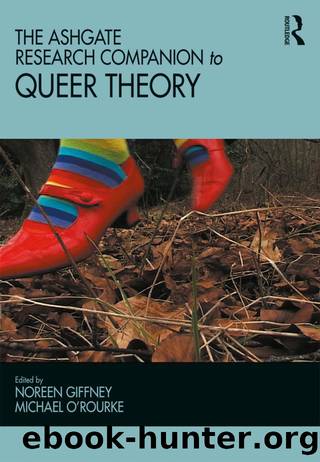The Ashgate Research Companion to Queer Theory by Michael O'Rourke & Noreen Giffney

Author:Michael O'Rourke & Noreen Giffney
Language: eng
Format: epub
Publisher: Routledge
Re(:)Searching Queer Studies in/on Taiwan
By way of conclusion, I would like to problematise the field of queer studies in and on Taiwan, foreground my own positionality in this circuit of cultural production, and reflect on the tactics and politics of intervention in this field. As demonstrated above, beyond certain identifiable academic institutions, publications and individual scholars, given the indeterminacy of the referents of ‘queer’ and ‘queer studies’ in the guise of their multiple Chinese translations, delineating the state of the field of queer studies in Taiwan as such is an almost impossible mission. My account of queer theory’s travel to Taiwan has thus far focused on its facilitation by scholars based in English departments. Besides the journals mentioned above, there have also been publications devoted to queer subjects ranging from special issues in literary magazines (Unitas, eslitebookreview) and community-based journals (Ai Bao) to research articles from the disciplines of architecture (Newsletter of the Research Center of Gender and Space) and sociology (Chu 1996). In addition, a distinction has to be made between queer studies conducted in Taiwan aimed at a Chinese-reading, local audience and those conducted outside of but on Taiwan targeted at an English-reading, glocal audience.23 For my purposes here, I will focus on the latter since a discussion of the former will not be meaningful to the target audience of this book.24
I must begin by stating that the little English-language research done to date on Taiwanese queer matters hardly constitutes a field. More importantly, the very act of surveying the state of a particular field, as Gail Hershatter suggests in her survey of the study of women in twentieth-century China, presents some ‘not-so-innocent taxonomical choices’ (2004, 992).25 Searching for research in queer studies (which is necessarily interdisciplinary) among various disciplinary practices throws up specific questions in each instance. While queer work exists mainly in English and cultural studies departments in Taiwan, the two most obvious disciplines in Anglophone academia for the study of queer cultures and sexualities of Taiwan are East Asian/Chinese studies and gender/sexuality/queer studies. However, as key members of AsiaPacifiQueer (APQ), a network of scholars researching Asian same-sex and transgender cultures and histories, point out, established Asian area studies departments are ‘often unsympathetic, if not hostile, towards critical theory and research on homosexuality and transgenderism’ whereas Anglophone queer studies has generally overlooked ‘issues of linguistic, discursive and theoretical translation at the heart of the practices of Asian queer studies’. The ‘imbricated networks of professional homophobia and eurocentrism’ have implications for institutional practices ranging from difficulties in finding sympathetic MA and PhD supervisors and limited access to research funding to restricted employment opportunities and the failure of libraries to collect relevant research materials (Jackson, Martin and McLelland 2005, 299). If academic institutions are in the business of knowledge production, we have to ask what kinds of knowledge are variously sponsored and censored by current institutional practices. Do institutional disciplinary practices ultimately serve to discipline the production of knowledge itself?
In addition to these practical problems facing scholars and
Download
This site does not store any files on its server. We only index and link to content provided by other sites. Please contact the content providers to delete copyright contents if any and email us, we'll remove relevant links or contents immediately.
| Biographies & Memoirs | Comics & Graphic Novels |
| LGBT Studies | Literature & Fiction |
| Mystery & Thrillers | Romance |
| Science Fiction & Fantasy | Travel |
Angels in America by Tony Kushner(2662)
A Burst of Light by Audre Lorde(2607)
Accepted by Pat Patterson(2371)
Unbound by Arlene Stein(2277)
And the Band Played On by Randy Shilts(2209)
The Velvet Rage by Alan Downs(1885)
Binding Devotion by Kiki Archer(1846)
The Gender Creative Child by Diane Ehrensaft & Norman Spack(1797)
Sister Outsider by Audre Lorde(1766)
Merv by Merv Griffin(1615)
Irreversible Damage: The Transgender Craze Seducing Our Daughters by Abigail Shrier(1568)
The Whole Lesbian Sex Book by Felice Newman(1478)
Living_by_the_Code_v1.1.1 by 2019(1394)
Queer City by Peter Ackroyd(1391)
Hindoo Holiday by J. R. Ackerley(1385)
Men on the Make: True Gay Sex Confessions by Shane Allison(1325)
The Girls: Sappho Goes to Hollywood by Diana McLellan(1320)
How to Understand Your Gender by Alex Iantaffi(1317)
Better With You by Ellen Joy(1180)
